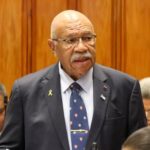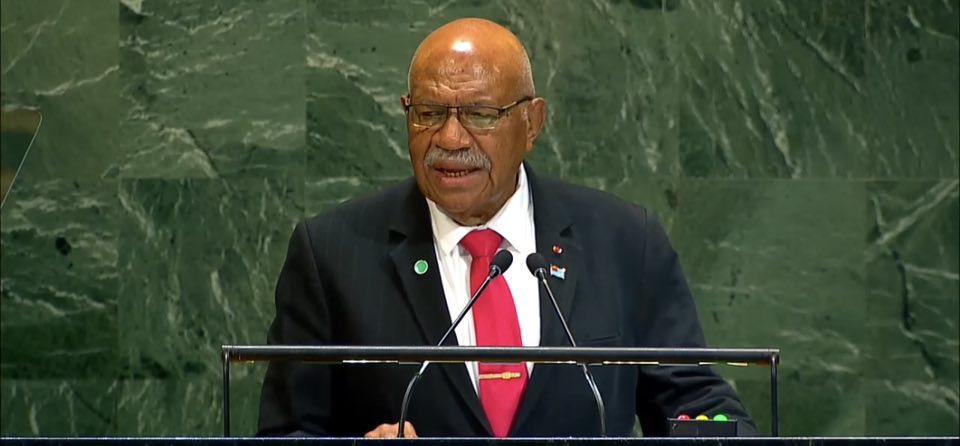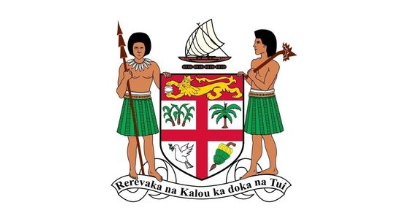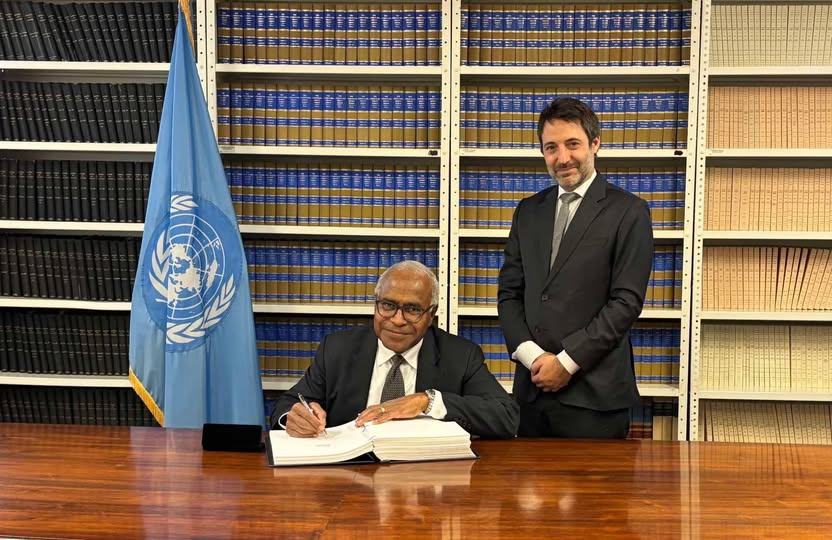
Prime Minister Rabuka meets UN Secretary General at UNGA80
27/09/2025
Prime Minister Rabuka delivers Ministerial statement on his recent official engagement overseas
01/10/2025Published On: 27/09/2025
80TH SESSION OF THE UNITED NATIONS GENERAL ASSEMBLY- UN HEADQUARTERS, NEW YORK
FRIDAY 26 SEPTEMBER, 2025
Theme: “Better Together: 80 years and more for peace, development and human rights”
Madam President of the UN General Assembly
The Secretary General of the United Nations
Leaders, Excellencies, Ladies and Gentlemen
Good Evening,
I congratulate Her Excellency Annalena Baerbock on assuming the Presidency of the 80th Session of the General Assembly, as only the fifth woman to be elected to this position in the last 80 years.
Madam President, Fiji reiterates its long-standing support for multilateralism and the role the international rules-based order plays for the status and interests of small states.
This year Fiji commemorates 55 years of independence and stands alongside member states and takes stock of the 80 years since the founding of the United Nations.
Eight years after independence, Fiji volunteered to be a troop contributing country to the United Nations’ peacekeeping effort. Our commitment is unwavering. We continue to be the largest per capita contributor to United nation’s peacekeeping for over four and half decades.
Our belief in the principles of the UN Charter is steadfast.
The most critical challenge facing nations in the Pacific region is to find an enduring framework that influences the strategic competition between the major powers, towards a stable multipolar region where peace prevails.
I am conscious of the direct connectedness between the Pacific and Indian Oceans, so when I talk of the Pacific, I am also referring to the Indo-Pacific Strategic area.
OCEAN OF PEACE
Excellencies, when I addressed this Assembly in September 2023, I introduced the concept of Ocean of Peace, as the Pacific’s contribution to global order. The turmoil within each of our regions and the global community has been the common theme of the World leaders’ statements this week. The question before us is: what must we do?
The vision of the “Pacific as an Ocean of Peace” is rooted in the noble values of mutual respect for sovereignty, territorial integrity, and political independence. It embodies the essence of our commitment to peace and unity. These are born from the very Pacific Way of life, that is the life-long integral heart to our identity as Pacific peoples.
It is my honour to announce that the Leaders of Pacific Nations had adopted the Ocean of Peace Declaration at the Pacific Islands Leaders Meeting, under the Chairmanship of SolomonIslands’ Prime Minister, the Hon Jeremiah Manele on Thursday the 11th of this month. In so doing, the Pacific Leaders have declared and claimed the right of our people to peace.
The concept of peace comes from deep within our faith in the God of peace and justice that finds its expression in our own Pacific Way.
The Pacific Way was a phrase coined by Fiji’s first Prime Minister, Ratu Sir Kamisese Mara, in his first speech in this Hall in 1970, to describe the ‘calm, conciliatory and orderly moves to independence’ by Pacific Island states. At the core of the Pacific Way lies respect, quiet leadership and reconciliation. It is not a coincidence that Chapter VI(6) of the UN Charter is entitled the “Pacific Settlement of Dispute” (Articles 33 – 38).
This concept therefore sits snugly with this year’s theme. “Better Together: 80 years and more for peace, development and human rights”.
The Pacific knows the value of peace as we had lived through the horrors of its absence. Our ocean, its diverse and vibrant lands had been a theatre of the two World Wars, and a testing ground for the world’s most dangerous weapons– its impacts are still felt and seen today.
It is our expectation that the Ocean of Peace Declaration is seen as the platform that spurs on the evolution of our region’s longstanding commitment to peace and prosperity.
Much has been said in this Forum about conflicts during the past 80 years including those raging today. I urge and pray for balanced considerations.
We look at how these conflicts started and by whom. Be it in Ukraine, Gaza or elsewhere. What is the motive of those that started these wars? What have they done to try and end it, if any? Is our prescription for a solution based on history, on truth, on fairness?
Madam President, we cannot be talking about ending the war without guaranteeing Israel its right to peaceful existence, nor the peaceful existence of the Ukrainian people.
For peace, we, collectively, have a responsibility to seeing this is done. Anything short, is hypocrisy on our part.
Building peace and sustaining it in the next 80 years demands of us to be truthful as the necessary first step.
That our aim must be for the dignity of peoples, on all sides of the conflict.
We cannot be selective with truth. Doing to others as we want others to do unto us’ is a must, if peace, sustained peace, is to be part of the new world order in the next 80 years.
Falling short of this might be a reason the United Nations is not delivering at capacity.
APPROACH TO THE ESTABLISHMENT OF THE FIJI EMBASSY IN JERUSALEM AND OTHER MISSIONS
Excellencies, sustainable peace is neither built overnight, nor by one actor alone. Progression from cold to warm peace demands faith, courage, and a strong will. The cost of building peace is usually high. Yet the cost of its absence is higher. If we hope to realize the full promise of the UN Charter, we must tackle the root causes of instability with the same urgency as we do their consequences.
This must start with truth – its understanding and acceptance – however difficult this might be. Without truth, our words are hollow, and our efforts destroy the very outcomes we desire. History plays a big part. In our pursuit of peace, we must pursue this on the right side of history.
These are not abstract observations. But informed by Fiji’s experience of 45 years in international peacekeeping engagements, where I was a peacekeeper. This is underlined by the Ocean of Peace principles to promote peace as we have done since WWII and especially during the recent four decades in the Middle East region. Our diplomatic engagements are informed by these principled understandings.
Under the Ocean of Peace, Fiji sees its responsibility in advocating peace within and on behalf of the Pacific region, a responsibility I do not take lightly as the Prime Minister of my country. Under our foreign policy priority of ‘family first Pacific regionalism, Fiji stands with our Pacific members.
We know that sustained peace is only possible with prosperity. Fiji’s primary focus is development where my government’s full attention is directed at poverty alleviation. Perhaps a way of assisting developing economies is to open markets for ourproduce. This reinstates and sustains the dignity of nations. Together, peace and development are integral to attaining the human rights of peoples.
Furthermore, peace and prosperity for our people mean addressing the expanded definition of security with climate change high on the list.
CLIMATE CHANGE
Fiji, like other small island developing states (SIDS), face ominous and disproportionate climate threats with negligible fraction of global emissions.
Those who shoulder the blame must foot the bill.
Science is clear, the powerful G20 Group has been responsible for 80 per cent of total emissions.
I plead with them that they must lead the charge – keeping with the principle of common but differentiated responsibilities and respective capabilities in light of different national circumstances.
Heading to COP30, I hope that the world will push harder, and members agree, on pending common grounds of concern. Fiji stands strongly in support of Australia’s bid to host COP31 as a Pacific COP.
We need a Loss and Damage Fund that meets the scale of the challenge – and developed countries meeting their adaptation financing promises.
We continue to reward polluters who wreck our planet. The fossil fuel industry continues to pocket massive profits and subsidies, while everyday people bear the costs of climate catastrophe – from rising insurance premiums to lost livelihoods.
We insist on a shift from fossil fuel subsidies and investments to a just energy transition by putting a price on carbon; And to implement innovative sources of financing – including solidarity levies on fossil fuel extraction – through legally-binding mechanisms.
Madam President, the ICJ Advisory Opinion on Climate Change on July 2025 affirms this -countries that are liable for climate change damage must bear the full cost. Some Pacific atolls sit 1 to 2 meters above mean sea level.
It is grossly unfair that when disasters hit, the costs of recovery force these countries to take on debts; a second layer of penalty for a situation they did not create.
As signatory to the Paris Agreement, we are contributing our fair share towards the global effort, to guide our low-carbon, climate resilient development.
DISPLACEMENT AND RELOCATION
Under our ‘family first Pacific regionalism’ foreign policy priority, Fiji stands with its fellow Pacific Island neighbors. Some of our smaller Pacific Island communities are struggling to stay above sea level. The international community is faltering in its commitments to keep below 1.5 degrees Celsius. Low lying Pacific states expect the worse.
Today, my government is looking at ways to host these island communities if it is not possible to remain on their islands.
The dignity of the people that are forced to leave their homes is fundamental. That starts with a legal definition. To date, they are merely referred to as ‘displaced people.
In the Pacific, where over 90% of land is communally owned, those that are being displaced will be landless before they become stateless, stripping them further of their dignity.
In this situation Fiji is coming face-to-face with the reality of ‘sovereignty within sovereignty’ in all its details.
Goodwill, time and resources are critical. This is complex, sensitive and costly work. We’re setting the precedent. We have no margin for error as we’re dealing with real lives, whose impacts may compound existing stresses.
OCEAN
Excellencies, one of the biggest victims of the climate crisis is the ocean itself. Fiji depends on the health and wealth of the ocean. We need to step up efforts to sustainably use and manage our ocean resources: address plastic pollution; conserve biodiversity.; and protect endangered species.
Fiji’s ratification of the BBNJ Agreement this year is intentional. We need to safeguard our ocean resources in line with the outcome of the Third UN Ocean Conference in Nice.
A much-needed shift is also required to address the ever-increasing share of fish stocks, exploited beyond sustainable levels in our Economic Exclusive Zones and the High Seas.
Subsidies is a well-known driver of overfishing and overcapacity. Fiji is not only actively addressing IUU fishing but also deposited its WTO instrument of ratification as our contributions to addressing this emerging threat.
The Plastic Treaty is an urgent goal that our global community can’t wait to end. With this, financing is key.
FINANCING FOR DEVELOPMENT
The convening of the Fourth Financing for Development in Sevilla and its “Sevilla Compromise” lays an important milestone to address global financing needs.
The existing financing architecture systemically disadvantages SIDS through complex processes and lengthy approvals while our communities face, daily, the ravages of climate change.
Reforms are needed now to address the widening gap that is now $4 trillion.
As a small economy, we need direct funding access modalities, simplified procedures, and SIDS-specific funding windows. Adaptation costs per capita are highest for island nations.
This must change to address our reality.
All these are mapped out in the Antigua and Barbuda Agenda for SIDS (ABAS). With two years lapsed, it is critical that ABAS is expedited with the implementation of its Monitoring and Evaluation Framework.
UN SIDS – SPECIAL SITUATION (ANTIGUA AND BARBUDA ACTION FOR SIDS AND MVI)
Excellencies, SIDS urgently require the expedited implementation of the Multidimensional Vulnerability Index (MVI) to complement GDP per capita criteria in determining development support eligibility.
SIDS have championed the MVI because of its direct relevance to overcoming the institutional blindness that has long ignored the reality of our unique circumstances and structural vulnerabilities.
The MVI provides a more comprehensive and accurate assessment of our development needs by incorporating factors such as environmental fragility, economic vulnerability, and structural constraints that traditional income-based measurements overlook.
For Fiji as with other SIDS, the implementation of MVI is a matter of development justice – ensuring that international support mechanisms recognize our inherent vulnerabilities and provide appropriate assistance regardless of per capita income levels.
We call upon the international community to prioritize the swift operationalization of MVI as this tool is essential to ensuring that no SIDS is left behind due to misleading income classifications that mask our true development challenges.
UN80 – UN PRESENCE IN THE PACIFIC REGION
Excellencies, as we mark the UN’s 80th anniversary and discuss UN reform, Fiji notes that the UN remains an indispensable partner for development in Pacific SIDS.
Our unique challenges require the specialized support that only the UN system can provide. Striking the right balance between a strong UN presence and operational effectiveness that reflects the priorities of PSIDS is preferred.
On our part, Fiji is finalizing arrangements for a purpose-built UN House that will provide a functional platform for UN operations.
CONSTITUTION OF FIJI
Excellencies, Fiji is pursuing constitutional reform. A recent Supreme Court ruling opened a pathway for the review of our constitution. This process ensures that the will of the people is accurately reflected in a revised constitutional framework that embodies the values of good governance and justice.
Our approach prioritizes human rights, and democratic participation while strengthening the institutional foundations necessary for sustainable democracy.
FIJI TRUTH AND RECONCILIATION COMMISSION
Fiji’s political journey has been marked by periods of instability. With the need for healing and progress, a Truth and Reconciliation Commission has been established to provide a platform for all voices to be heard, particularly those affected by past upheavals.
This Commission represents our commitment to confronting our history, fostering dialogue between communities, and building the foundation for a more coherent society. While this is progressing, we remain committed to international peace, stability, and the values that unite us as members of the international community.
We congratulate those countries that have successfully trodden this path before and encourage those that haven’t to get on it too.
DRUGS
Excellencies, Fiji is challenged by an upsurge in transnational organized crime. Drug trafficking has exploited our vast maritime domain, spanning over 1.3 million square kilometers of ocean. This crisis threatens our national security and social fabric while exploiting our limited capacities.
Our approach must be holistic, combining law enforcement with mental health support, community-based recovery programs, and trauma-informed care for those affected.
Fiji looks forward to working with partners to addressing trafficking sources of supplies, routes, enforcement, disrupting and dismantling supply, reducing demand, healing and rehabilitation of affected individuals and communities.
National Security Strategy: The Role
In response to the multitude of issues confronting Fiji following 16 years of autocratic rule, and the responsibilities associated with being the regional hub, a structured way of managing the security front was needed. Fiji launched its National Security Strategy (NSS) in June this year. This came at the back of Fiji’s first ever Foreign Policy White Paper and National Vision document.
The Strategy serves as the framework to safeguarding Fiji’s national security interests in an increasingly complex security environment.
Further, the strategy embraces the tenets of regionalism in the 2050 Pacific Strategy for the Blue Pacific, that also promotes prosperity, human rights, and cooperation with partners.
NON- COMMUNICABLE DISEASES
Additionally, Fiji confronts a non-communicable disease pandemic that poses one of our greatest public health challenges in years. Our response strategy aligns with SDG Goals 3 and 4, embracing linked approaches to ensure right lifestyle choices, accessible and quality care; and scaling up the healthcare workforce.
We are fostering public and private partnership to leverage innovation, expertise, and resources to reduce premature mortality from NCDs by one-third by 2030. A health-first approach is necessary for national growth and resilience.
DIASPORA STRATEGY
Excellencies, for a small economy we need all hands-on deck. Fiji recognizes the potential in our diaspora community of approximately 300,000 Fijians worldwide. Their remittance exceeded one billion dollars in 2024. Optimising this capacity through an appropriate strategic framework will enhance their engagement as partners in national development. I believe that distance does not diminish citizenship, and their expertise and networks are bridges and catalysts for growth and global reach.
SECOND WORLD SOCIAL SUMMIT
Fiji welcomes the convening of the Second World Summit for Social Development, to be held in Doha in November (2025).
This is a useful platform to address pressing social challenges that disproportionately affect SIDS and the global South.
The Summit is an opportunity to renew our collective commitment to ensuring that social progress remains at the heart of our development efforts.
CONCLUSION
Excellencies, as we stand at this juncture of human history, Fiji calls on all member states, on us, to embrace with far greater commitment the values which is the foundation of the United Nations.
This is a defining moment. We cannot compromise on truth, love, faith, and justice. What hope do we have for the next 80 years if we lose our principles. ‘Peace on earth and goodwill to all man’, came at a price.
Our wisdom is in not having to keep on paying that price because we abandoned the values that was the United Nations. We must act with the urgency and purpose that this moment in history demands.
Our shared humanity depends on our courage to act as one. In those values, there, you will find Fiji standing with you.
Thank you, and May God Bless us all.
VIDEO LINK
https://youtu.be/aVdJnMYtr4k?feature=shared






